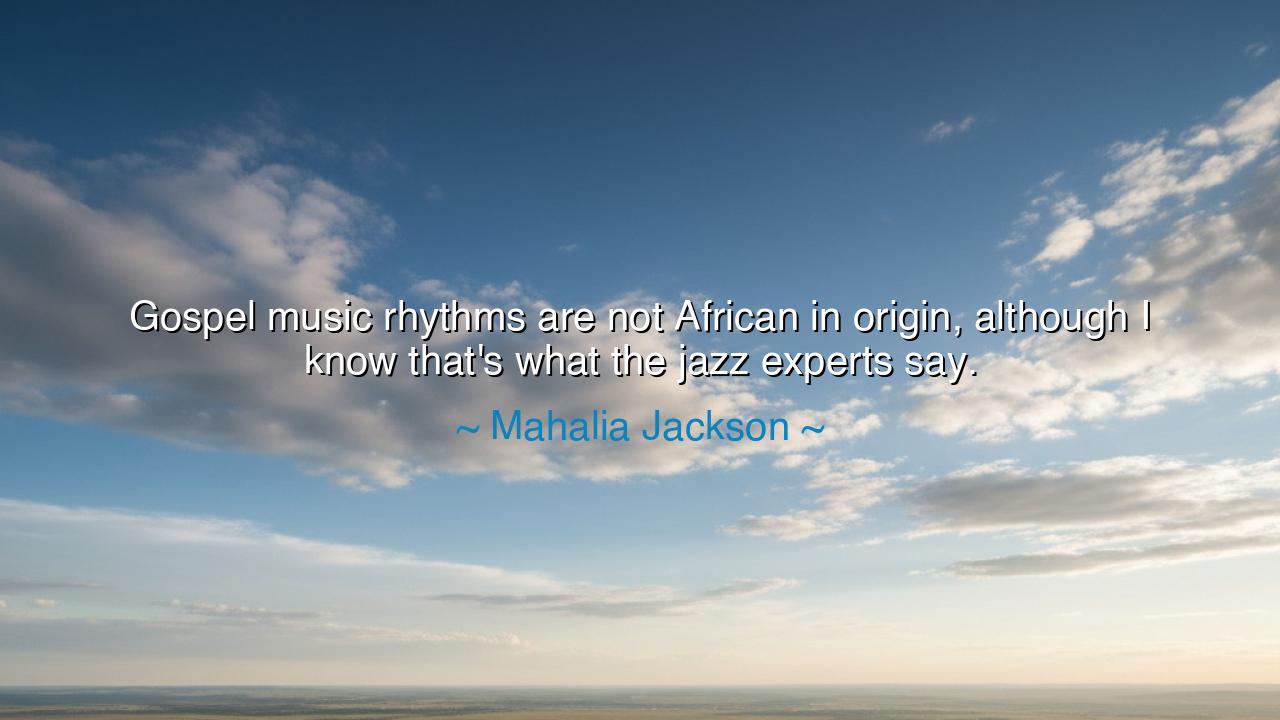
Gospel music rhythms are not African in origin, although I know
Gospel music rhythms are not African in origin, although I know that's what the jazz experts say.






Hear the solemn voice of Mahalia Jackson, the Queen of Gospel, who declared: “Gospel music rhythms are not African in origin, although I know that’s what the jazz experts say.” In these words lies a truth forged from the depths of history and faith, a truth that speaks not only of musical lineage, but of identity, struggle, and the sacred fire of a people’s voice. For gospel music was not merely the inheritance of rhythm—it was the cry of the soul, lifted heavenward in times of trial, born of suffering, yet clothed in hope.
When Mahalia speaks of origin, she draws a line between the earthly and the divine. The jazz experts searched for roots in Africa, tracing beats and polyrhythms across oceans, linking one culture to another. Yet Mahalia, raised in the black churches of the American South, knew that gospel was something different. Its rhythms were not merely patterns of the drum, but the pulse of prayer, the cadence of Scripture, the breath of faith under bondage. Its foundation was less in geography than in theology, less in the body than in the spirit. It was music born not only of heritage, but of encounter with God.
Consider the story of the African American church itself. From slavery’s chains, men and women lifted spirituals—songs that spoke of freedom, deliverance, and the Promised Land. These songs, though echoing distant African inflections, were transformed by Christian hope, by biblical imagery, by the fire of belief in redemption. From those spirituals grew the gospel rhythms—not wild dances of the village, but ordered patterns that stirred hearts, drove choirs, and summoned congregations to worship. Mahalia was right to insist: the rhythm here was sacred, not secular; it was born of longing for salvation, not merely of earthly ancestry.
Yet let us not dismiss the wisdom of the jazz experts too quickly. For jazz itself drew heavily from both Africa and gospel, creating a bridge between the spiritual and the worldly. The syncopations, the call-and-response, the improvisations—all bore resemblance to African traditions. But gospel, as Mahalia knew it, had a different aim: where jazz sought expression, gospel sought salvation; where jazz moved bodies, gospel moved souls. To conflate them was to blur the holy with the worldly, and Mahalia, as guardian of gospel’s sacred fire, would not allow that confusion.
The power of her statement also lies in its defiance. In a world where scholars, critics, and cultural gatekeepers often spoke over the voices of practitioners, Mahalia raised her voice as both witness and authority. She had lived this music, sung it in churches, carried it into halls across the world. She was not merely theorizing—she was testifying. And in her testimony we learn that the truest knowledge of art comes not from books or experts, but from those who embody it, who breathe it, who let it carry them through both sorrow and triumph.
The lesson for us is profound: do not let others define the meaning of your heritage, your faith, or your art. The world will always have experts, always have critics, always have voices claiming to explain your life better than you can. But Mahalia teaches us that authority lies in experience, in living truth. Whether in music, in work, in love, or in struggle, speak from what you have lived, and do not let the wisdom of others drown out the song of your own soul.
Practical wisdom follows: when you engage with your own passions or traditions, know their history, but also honor your experience. Learn from scholars, but trust your spirit. If you create, create not only from theory, but from the marrow of your life. And above all, remember that your art, your faith, your story, has meaning beyond what the world tries to explain. Like Mahalia, you may find yourself standing against the experts, but stand firm, for truth often flows from the lived heart rather than the distant mind.
Thus, her words endure: gospel music rhythms are not simply the echo of Africa, nor simply the analysis of jazz, but the living testimony of a people who turned pain into praise, despair into deliverance, bondage into song. Mahalia’s teaching calls us to honor that sacred transformation, and to live our own lives in such a way that even our struggles may become songs of hope for generations to come.






AAdministratorAdministrator
Welcome, honored guests. Please leave a comment, we will respond soon